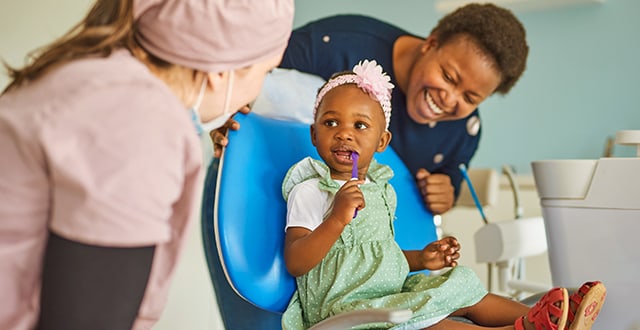Need help finding a dentist?
Call the number on your member ID card.
Maintaining Your Child’s Oral Health
Healthy Teeth for Healthy Children
Maintaining Your Child’s Oral Health
For infants and toddlers
Clean your baby’s gums even before they have teeth. Rub a warm, wet, clean washcloth or dampened gauze across your baby’s gums after feeding. Getting in the habit now will make it easier to brush new teeth in a few months.
Brush when you see teeth. The first tooth usually appears when babies are 6 to 10 months old. The Centers for Disease Control and Prevention recommends that you brush your baby’s teeth twice a day. Use a soft-bristled toothbrush and a tiny dab of toothpaste. Don’t worry if your baby swallows the toothpaste; in small amounts, it’s OK. Most kids don’t rinse after brushing until around age 2.
Take your baby to the dentist as soon as they get their first tooth, but no later than 12 months old. While you are there, ask your dentist if fluoride supplements are right for your baby.
Avoid tasting your baby’s food, testing bottles, or cleaning pacifiers with your mouth. You can pass along bacteria to your baby this way, so it’s best to rinse these items with clean water before you put them in your baby’s mouth.
For children ages 2-10
Take your child to the dentist for a checkup every six months. Ask your dentist if fluoride is right for your child. Fluoride supplements are often recommended if your tap water doesn’t contain fluoride. Fluoride varnish is applied directly to teeth by a dentist.
Show your child how to brush with a pea-sized amount of fluoride toothpaste and a soft-bristled toothbrush. At around age 2 children can learn how to brush their own teeth, but they still need your help. They should brush for two minutes twice a day. Teach them not to swallow toothpaste. While your child is still learning how to brush their teeth, until around age 7, you should re-brush their teeth after they do it themselves.
If it is difficult for you to get your child to the dentist, reach out to your local Public Health Dental Hygiene Practitioner for help with your child’s oral hygiene.
Set an example as a parent by taking good care of your teeth.
For children ages 11-18
Take your child to the dentist for a checkup every six months.
Make sure your kids are brushing their teeth twice a day with fluoride toothpaste. They should also floss daily. Brushing and flossing helps remove plaque. Plaque forms from food that is broken down in the mouth. Plaque is the main cause of cavities and gum disease.
Help children value dental health. Your children may not want to brush their teeth, floss every day, or stay away from unhealthy food. You can tell your child that stained teeth and bad breath are a result of poor oral hygiene. This may convince them to take care of their teeth.
Need help with your child’s dental routine?
Reach out to our Public Health Dental Hygiene Practitioners and connect with the team member who works in your area to get help.
The Risks of Sugary Drinks
Healthy teeth need more than just brushing and flossing. Children need to eat healthy to be healthy. Watch the video below to learn about managing sugar levels in your child’s beverages:
Healthy eating is important for both dental and overall health. Children grow strong teeth and bones by eating lots of fruits and vegetables. They also lower their risk of cavities by staying away from sugary drinks and snacks.
Healthy Teeth for Healthy Children
Children should see a dentist every six months. Your dentist may recommend your child get a fluoride treatment to prevent cavities and tooth decay. Having healthy teeth is important for your child's health.
Baby teeth begin to grow between age 6 months and 1 year. Children begin to lose their baby teeth around age 6. If your child loses a baby tooth early, you can help to make sure that their adult teeth grow into their proper spaces by consulting your dentist. Your dentist may place space maintainers to prevent permanent teeth from growing in too early. Space maintainers prevent further issues that may cause the need for braces.
Teeth growing in improperly can not only affect your child’s appearance, but also their speech abilities. Teeth control the airflow out of the mouth, affecting the way words are formed.
Children who develop healthy oral hygiene habits tend to keep them in adulthood. This lessens their risks for cavities, tooth loss, and gum disease. It is also a key step in preventing oral cancers. Teach your children why healthy teeth are important so they stay healthy all their lives.
For information about oral health care for children with disabilities, watch this video from Dr. Brian Martin, Chief of Pediatric Dentistry at Children's Hospital of Pittsburgh.
This interactive dental health module educates young children on how to care for their teeth. Learn about brushing, flossing, and healthy food and drink choices!
